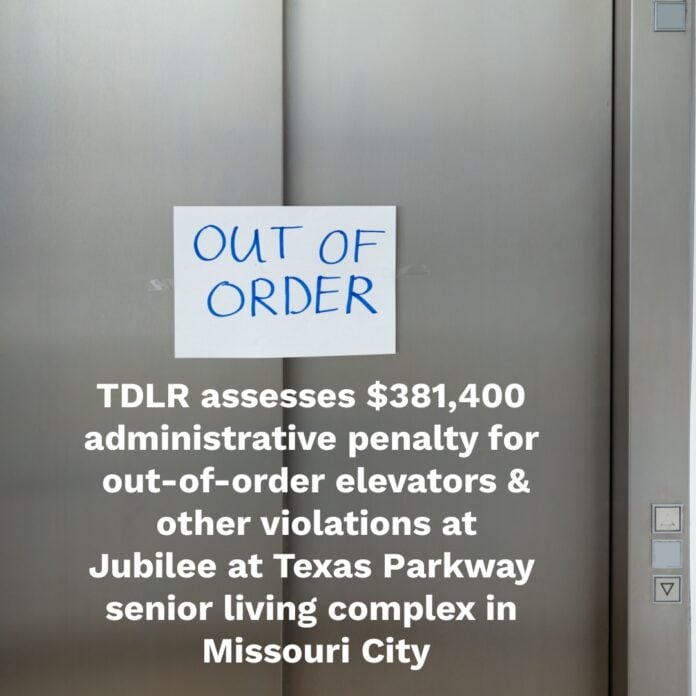AUSTIN — The Texas Department of Licensing and Regulation has issued a Notice of Alleged Violation (NOAV) and assessed an administrative penalty of $381,400 to the Jubilee at Texas Parkway, a senior living complex in Missouri City, for operating outside of the standards and codes required for elevators in Texas.
According to media reports, residents of the upper floors of the complex have been unable to leave their rooms since early May because the elevators are inoperable.
Neither elevator at the complex is currently functioning and the building owner has not reported them to TDLR as out of service. In addition, neither elevator has been reported as having had a safety inspection every 12 months as required by state law.
The building owner is responsible for obtaining a Certificate of Compliance for each elevator and escalator in a building, and for posting it in a conspicuous place. When an elevator is placed out of service, a building owner must notify TDLR within 30 days.
- One of the elevators at the Jubilee (Decal #11857) was inspected in 2021 and 2023, and Jubilee never properly reported those inspections to TDLR and did not maintain the required inspection cycle.
- The other elevator at the Jubilee (Decal #11858) was inspected in 2021, 2023 and 2025, and Jubilee never properly reported those inspections to TDLR and did not maintain the required inspection cycle.
During an investigation into the complaints received in early May, TDLR found that neither elevator on site has a current Certificate of Compliance and they have not had one for 1,557 days. The investigation also found that inspection reports for the elevators have not been filed with TDLR for 1,557 days.
TDLR prosecutors are alleging the following violations:
- 2 Class C violations for failure to maintain equipment in compliance with Texas standards and codes
- 4 Class C violations for failure to have an annual inspection of each elevator
- 4 Class C violations for failing to notify TDLR of equipment placed out of order within 30 days
- 34 Class A violations for failing to file inspection reports and applicable fees within 30 days of an inspection
- 1,557 Class B violations for failing to obtain an annual certificate of compliance
The Texas Occupations Code authorizes TDLR to assess administrative penalties of up to $5,000 per day per violation. The Department’s Enforcement Plan provides for an administrative penalty:
- Up to $1,000 per unit of equipment for a Class A violation;
- $1,000 up to $3,000 per unit of equipment plus file required documents and pay applicable fees for a Class B violation;
- $1,000 to $5,000 per unit of equipment plus obtain inspection for a Class C violation;
- $5,000 per unit of equipment for a Class D violation.
Jubilee at Texas Parkway must immediately bring the building’s elevator equipment into full compliance by obtaining a current Certificate of Compliance for all equipment related to the violations or TDLR could seek an Emergency Shutdown Order for the elevators at the site.
About NOAVs
A Notice of Alleged Violation (NOAV) details violations of law or rule by the licensee or person who should be licensed and generally seeks administrative penalties and lists possible sanctions against the licensee.
- An administrative penalty is a monetary fine paid to the State of Texas.
- A sanction against a licensee could include license suspension, probation or reprimand and could include revocation. Each TDLR program has specific violations, administrative penalties and sanctions that are reflected in the TDLR Enforcement Plan. The Elevator Enforcement Plans is available on the TDLR website.
Prosecutors consider these factors when determining the level of sanction and the penalty amount:
- The severity or seriousness of the violation
- Whether the violation was willful or intentional
- Whether the respondent acted in good faith to avoid or mitigate the violation or to correct the violation after it became apparent
- Whether the respondent has engaged in similar violations in the past
- What level of penalty would deter future violations, both by the respondent and the industry as a whole
- Any other matter that justice may require.
When prosecutors send the NOAV, they include a settlement offer for respondents. If a respondent agrees to the terms of the settlement, the TDLR Executive Director will issue an Agreed Order that typically requires the respondent to do certain things, such as paying an administrative penalty, paying restitution or making repairs for the consumer, completing additional education or providing required documentation to TDLR. The agency then monitors the respondent’s efforts to comply with the agreed order until the requirements are completed.
If the respondent does not agree to a settlement offer and does not request a hearing in a timely manner, the TDLR Executive Director can issue a Default Order against the respondent that includes penalties or sanctions, without first conducting a hearing.
The respondent has 20 days after receiving a NOAV to request a hearing in front of the State Office of Administrative Hearings (SOAH). The case is heard by an administrative law judge, who listens to both sides and then submits a Proposal for Decision (PFD), which includes their proposed findings of fact and conclusions of law, as well as a recommended outcome for the case. The PFD is not a final decision in the case.
The Texas Commission of Licensing and Regulation reviews the PFD during a public meeting and, after hearing from TDLR prosecutors and the respondent, decides whether to accept the PFD as written or whether commissioners would prefer to make amendments. Once the Commission has made a decision, it issues a Final Order.
Once the Final Order has been issued, the respondent can file a motion for rehearing if they think that either the Executive Director’s order or the Commission Order has errors. The motion must specifically identify the errors in the Order. If the Commission denies the motion for rehearing, the respondent can file a request for judicial review with the Travis County District Court. TDLR is represented in district court by the Texas Attorney General’s office.














